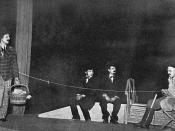To understand Beckett and the Theatre of the Absurd we must first go back to Beckett's roots in Irish theatre. It was Martin Esslin who coined the phrase 'The Theatre of the Absurd.' Esslin attributed this form of drama to the moment when 'the certitudes and unshakeable assumptions of former ages have been swept away, that they have been found wanting... The Theatre of the Absurd has renounced arguing about the absurdity of the human condition; it merely presents it in being - that is, in terms of concrete stage images' (Harrington, 2004). It was a revelation in his home country of Ireland that led Beckett to explore this method of drama, a revelation immortalised in his short play, Krapp's last tape. He saw a pointedly nihilistic vision of every organising philosophic principle in our life. He saw them all as archaic and therefore leading us down a road that would not only fail to fulfil our potential, but lead us into ignominy, failure and depression.
This was the beginning of his deconstruction of all the traditional aspects of theatre, including staging, characterisation and even the resolution of plays.
This new form of theatre, minimalist in its physicality but grand in its scope, ironically has its roots in the mythic style of the Irish national theatre, a theatre that had almost exclusively been born in the Abbey theatre; a theatre where large characters debated even larger themes. 'The Irish play' had become one designed along specific themes of rebellion and unity. Ultimately however it became a caricature of itself, tying down artists instead of allowing them to express themselves fully. However much is owed to this theatre in terms of Irish literary heritage, there needed to be a new voice, a new approach. Sadly Beckett had to go to...


